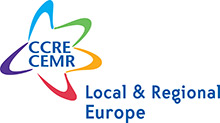| If the message does not display correctly, click here. |
Follow us |
 |
Newsletter - April 2020 Council of European Municipalities and Regions
|

| Cohesion |
 |
Opinion article | How to upgrade the EU’s COVID response in the territories
While all of Europe is reeling from the coronavirus pandemic, the crisis undeniably has a strong territorial dimension. Some localities and territories are more severely affected and different regions are not equally well equipped to deal with such a rapidly propagating virus. There is unbearable pressure on hospitals and health services, most severely in areas such as northern Italy, Spain, northern England, or eastern France.
Municipalities and regions are at the forefront of this crisis, whether in enforcing lockdowns, continuing to provide essential public services – above all healthcare and support for the most vulnerable – or in leading the gradual relaxation of containment measures. At the same time, many of their sources of revenue are falling due to the closure of public facilities and the general economic slowdown. [ Read more ] |
| Equality |
 |
COVID-19's impact gender inequality in our cities
The COVID-19 crisis risks worsening our societies’ already existing gender inequalities. In this analysis by CEMR and Urbact, we provide a detailed initial overview of the ways COVID-19’s impact has differed for men and women.
Indeed, while men are more likely to die of coronavirus, women are more likely to be affected in other significant ways. For example, there have already been reports of increases in domestic abuse as a result of prolonged confinement. [ Read more ] |
| Waste management |
 |
Safely collecting household waste in the age of COVID-19
Cities and regions across Europe face many challenges in collecting household waste while limiting the spread of the coronavirus. To contribute to tackling this issue, CEMR held an online meeting on April 2 with our members to discuss their experiences and the measures taken to ensure continuity of service and the safety of waste personnel.
While the situation varies in different European countries according to local conditions and national regulation, a few recurring trends and lessons can be observed. [ Read more ] |
| OECD |
 |
OECD analyses the impact of COVID-19 on cities and regions Local and regional governments are at the frontline of the response to COVID-19. Their regular services are being put under pressure because of social distancing and care is being provided to the sick and vulnerable, while their sources of revenue are shrinking due to the economic slowdown.But what short-medium-and long-term effects does the pandemic have on local government functioning and finance? And how have municipalities and regions responded so far? These are the questions the Organisation for Economic Cooperation and Development (OECD) is seeking to answer in two reports: one dedicated to territories and the other specifically focusing on cities. [ Read more ] |
| Decentralised cooperation |
 |
11 ways to promote a coordinated global response to COVID-19
As a pandemic, COVID-19 is a truly global problem which knows no borders. As such, the European Union recently presented its “global response” to coronavirus. Together with its partners, PLATFORMA is making 11 recommendations to ensure a coordinated international approach.
Last week, the European Commission and EU development ministers agreed on the Union’s global plan against coronavirus. It will mobilise €20 billion for partners in Africa, Asia, Latin America and eastern Europe to support their fight against the pandemic. [ Read more ] |
| EU’s COVID response |
 |
Recommendations to better implement the Coronavirus Response Investment Initiatives
The European Commission has presented an important set of financial measures to mitigate the impact of the COVID-19 outbreak: the Coronavirus Response Investment Initiatives (CRII and CRII+). These will capitalise on still unspent cohesion funds to contribute to the response to the coronavirus in EU Member States.
The CRII initiatives introduce more flexibility to allow Member States to use cohesion funds to buy medical supplies, as well as to finance economic and social support for SMEs and workers most impacted by the crisis. [ Read more ] |

| Contact | With the financial support of the Europe for Citizens programme |

|